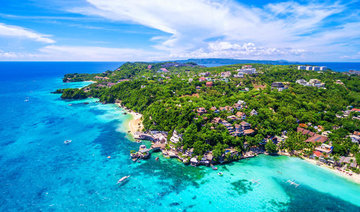DUBAI: The Philippine government is keeping its target for tourist arrivals this year despite the closure of Boracay Island, one of the country’s major magnets for foreign visitors.
“[Our target tourist arrivals] is still the same, 7.5 million [this year]. We’re hoping we will be able to [reach] the target,” newly appointed tourism secretary Bernadette Fatima Romulo Puyat said during her confirmation hearing on Wednesday.
The world-renowned Boracay Island, located in central Philippines, received over two million tourists last year, with foreign visitors coming mostly from China, South Korea and Taiwan. Tourist spending in the island also rose 14.83 in 2017 to 56.15 billion pesos ($1.07 billion) from 48.9 billion pesos the previous year.
The Philippine government has implemented a six-month closure of Boracay, named in 2016 as the world’s best island by Condé Nast Traveler's 2016 Readers’ Choice Awards, over concerns the island’s famous white sand beaches and turquoise waters have become a ‘cesspool’ because of environmental abuse.
No tourists – domestic or foreign – are allowed entry into the island during its half-year clean up and rehabilitation.
“Almost all our cancelled bookings were for Boracay; our business was affected by the refunds we have to give our clients,” tourism operator Izrael Felipe G. Nilo, Jr. told Arab News. “Hopefully the closure [of Boracay] will be lifted by October, or even earlier.”
Tourists are now diverting into alternative destinations with Boracay closed, Nilo added.
“There was a definite effect of the Boracay closure on our international markets, particularly the Korean and Chinese markets which typically hits its peak from June onwards,” Jose Clemente III, president of the Tourism Congress of the Philippines, meanwhile told Arab News. “Thousands of bookings and losses into the hundreds of millions for the resorts and other establishments will have been lost due to the closure.”
“[Achieving the tourism target] will be a tall order considering that one of the Philippines’ main destinations was closed,” Clemente added. “We have been trying to divert our bookings to the other destinations like Cebu, Bohol, Palawan and others but since the closure was done on short notice, those other destinations were already full or approaching full capacity.”
Tourism chief Romulo Puyat also said her department would be promoting these alternative destinations and “a lot of them [tourists] have already diverted to Cebu, Siargao and Bohol.”
She also committed “to prioritize improving polices on access, connectivity and security as well as enhance programs on tourism infrastructure.”
Cebu is home to the Sinulog Festival and whale shark watching in Oslob; Siargao is considered the Philippines’ surfing capital while Bohol boasts of the tarsier – the world’s smallest primate – the Chocolate Hills and Panglao’s beaches, which are comparable to that of Boracay’s.
“The Philippines has become a popular in the past few years and our destinations have been experiencing good arrivals which makes diversions from Boracay a bit difficult. While we do have other upcoming destinations like Siargao, Dumaguete and others, they may not yet be ready to take in the massive numbers for a variety of reasons such as accessibility, available accommodations, infrastructure to name a few,” Clemente said.


























